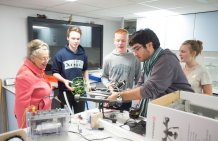
Exeter’s Lord Mayor, Councillor Lesley Robson visited the school to see the course in action this week
Lord Mayor witnesses innovative maths and science curriculum at Exeter school
Exeter’s Lord Mayor has witnessed the innovative curriculum at a South West school which is leading the way in teaching science and maths.
Teenagers from Cornwall, Devon, Dorset and Somerset all attend the Exeter Mathematics School, a state-funded sixth form for mathematicians which is sponsored by the University of Exeter and Exeter College.
Pupils work with university academics and companies such as Dyson and the National Hydrographic Office to complete research into topics such as autonomous flight, artificial gills and neurons.
With increasing demand for competent mathematicians, the government is committed to opening more schools like the Exeter Mathematics School across the country as part of its Industrial Strategy and teachers are sharing their curriculum with colleagues elsewhere.
Exeter Mathematics School, which opened in 2014, is one of only two “free” schools for enthusiastic young mathematicians and scientists in England. The sixth form offers young people in the South West who show potential to do well in STEM subjects the chance to study in an exciting and challenging environment. Central to their education is the Exeter Mathematics Certificate (EMC): a course that enables students to develop research skills whilst exploring a subject of interest.
Exeter’s Lord Mayor, Councillor Lesley Robson visited the school to see the course in action this week. Having read mathematics and physics at university, worked as a computer programmer and taught mathematics at an international school, she well understands the importance of developing our talented students and is keen to support its development in the region.
Cllr Robson said: “It’s wonderful to see the work being done here. Students are being supported to have the right attitude for success and it’s fantastic to see the progress they have made by their second year. The students have really impressed me with their attack and willingness to get stuck into some very challenging problems.”
Dr Ed Horncastle, who leads the Exeter Mathematics Certificate work at the school, said: “The research which forms part of the course is extremely challenging and goes way beyond the scope of the A-level syllabus. Students work independently and collaboratively with each other to solve real world problems. The challenge of an open ended problem with no known answer gives space for our students to grow and their progression through the course into free thinking young adults is a joy to behold. They soon become experts in their chosen subjects, often teaching the staff.”
Students study in groups in their first year, completing projects set by industry experts and academics. They achieve the full certificate by completing a piece of individual research in their final year.
Peter Martin from Falmouth in Cornwall is completing individual research into “The Evolution of Trust in Game Theory” and is hoping to study Theoretical Physics at university next year.
Peter said: “Through these projects I’ve had to take responsibility for my own work and learning. They force you to reflect in a way that doesn’t normally happen in the classroom. I feel more prepared to cope with the style of working at university than I would have done from just A-levels.”
Hattie Palmer from South Petherton in Somerset is one of a group studying the mathematics of elections with Dr Joanne Mason from the Univeristy of Exeter. Although they’ve only been working on the problem for a couple of weeks, they are already discovering there is only a small likelihood of an election returning a government that over 50 per cent of the population have voted for.
Hattie said: “I’ve always had an interest in politics so this is a very interesting project for me. The research is very hard and it’s a new experience to struggle and get stuck, but I feel I’m getting more out of myself than I thought was possible.”
Headteacher, Kerry Burnham said: “Of course we want students to achieve high grades, and they do; but education should be about so much more. We are preparing students to have the skills, attitudes and resilience to thrive once they leave us. Through the EMC our aim is to ensure they are well equipped for future study and employment”.
Provost of the University of Exeter, Janice Kay, said: “We are so proud of the success of the Exeter Mathematics School which continues to go from strength to strength. It demonstrates that specialist schools really do help children from all backgrounds to thrive and the opportunities students receive through the EMC module, and working with world leading academics, help to inspire, stimulate and challenge them to fulfil their potential.”
Date: 28 September 2017
